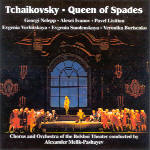Moscow, 1952. Not exactly the time and place for anyone in his right mind to want to be, but this recording makes you wish for a time capsule that would zip you to the Bolshoi for a performance of Pique Dame with this cast and conductor, then zip you right back to civilization. Until such a device is invented, this recording will have to do–and it serves the purpose quite well since Preiser’s engineers have cleaned up the mess created by the original Soviet technicians and their co-conspirators at the pressing plant. Extraneous noise has been eliminated with enough discretion that overtones aren’t unduly removed. The result is a generously-timed two-disc set that, with what sounds like the help of a bit of added reverb, is vivid without being overly bright. There’s a trace of distortion at climaxes and some congestion–quite listenable though without the nuances and openness of a good modern recording.
Preiser’s production standards are down to its usual level–bare-bones notes largely limited to act-by-act plot synopses, an insufficient number of tracks, none with timings listed, and some of which are far too long. And while the discs themselves have “Historic Recording” printed on them, nowhere does Preiser give us any information about the participants or even the dates and venue of the recording.
But the performance is the thing, and it’s an excellent one, featuring fast-paced conducting that sweeps you along, and passionate, full-blooded singing in the Russian style that’s all but vanished these days (compare this with the Kirov’s on Philips and you’ll see what I mean). It’s far from flawless: Melik-Pashayev could be more relaxed in places without compromising the dramatic authority of his interpretation; the orchestra’s raw power, welcome as it is, loses detail and vividness because of the dated engineering; and some of singing in the lesser roles is provincial. But none of this matters much given the excellence of the leads.
The Herman (as given here, or Gherman in other transliterations) is Georgi Nelepp, the Bolshoi’s leading tenor of the period (and the antithesis of the lighter-voiced, more mellifluous and wayward Ivan Kozlovsky, the other bright light of Soviet opera of that era). Nelepp’s singing and characterization is several leagues beyond the Hermans of other available complete Pique Dame recordings. His voice is big enough to capture Herman’s macabre obsession but he also gives us a rounded character whose noble side, so often neglected by singers, helps explain Lisa’s attraction to him. Lisa is Evgenia Smolenskaya, whose big dramatic soprano transcends the girlish Lisa more often heard. Here, she’s a strong young lady with a voice to match, so her interactions with Nelepp are less one-sided than we usually get. She’s also blessedly free of the edginess and wobble that used to be a standard part of many Russian sopranos’ vocal equipment.
Alexei Ivanov is a fine Tomsky, though he often exhibits the back-of-the-throat vocal projection that takes some getting used to, also typical of some Russians of that time. The Pauline, Veronica Borisenko, sings a lovely Romance and the great baritone Pavel Lisitsian makes his relatively brief role as Prince Yeletsky a treat for the ears. Even if you have a modern recording of Pique Dame, if you love this opera you should hear this version.
































